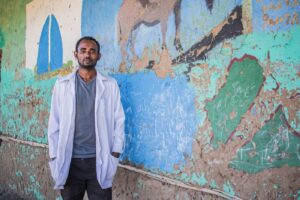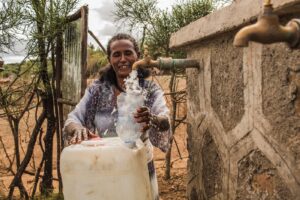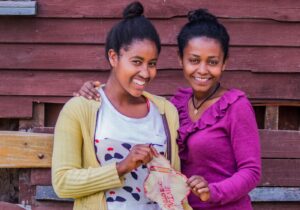Growing up in a very rural area in Seydebir, Semien Shewa, Ethiopia, Tigist had to walk for an hour to go to school. Every day, she had to go out early with her brother, hike uphill and downhill, cross a river under the sun’s heat to reach her school. That was her routine till she finished her primary school. Tigist had often heard stories of girls who had drowned in the river, who got raped or abducted on their way to school. Her close relative was one victim, who got abducted when she was only seven years old. She had never came back to school or even to her home. Hence, Tigist’s walk to school was filled with fear. When Tigist finished primary school, the nearest high school she could join was 4 hours walk from her home, hence she moved to live with her older sister in Addis Ababa, Ethiopia.
Tigist Worku, 20, is now a graduate student of Integrated Science department at Kotebe Metropolitan College, in Addis Ababa. She is also one of the 60 recipients of the training on Gender Responsive Pedagogy organized by UNESCO-HNA to graduating students. “I have learned how I can be more gender responsive while teaching, how to execute student’s performance assessment, be sensitive of gender stereotype and ensure gender equality and equity in school and so on,” she says.
Tigist is currently doing an internship at Netsanet Birhan Primary school, in Addis Ababa, Ethiopia. She teaches the third grade that has 38 students, from which 14 are male and 24 are female. Teaching is not new for Tigist as she had volunteered in various schools before her internship. Tigist mentioned that the challenges she faced growing up in rural area might be different from challenges girls face in urban areas, but everywhere there are challenges of gender equality. When she started her internship, Tigist noticed that the female students are not comfortable playing with the boys and that there are fewer female participants in the class.
One of the things Tigist learned at the training was focused on the representation of girls in school textbooks. When she started teaching, Tigist has noticed that on the textbook, notes, quizzes and illustrated examples were made in reference to male gender. Thus she determined to make a change before she finished her internship. “This is something I never noticed before the training,” she says. Now Tigist intentionally addresses both female and male students equally, during teaching and while preparing exam questions. She also mentioned that, “the text books made it seem like professions like engineering, medicine, and piloting were only reserved for male, thus female students can grow up feeling that they cannot succeed in these areas.” She stresses that such errs, that seem minor, can reinforce stereotypes about gender roles in society and make girls grow up feeling inferior. She adds that the one thing that stuck with her after the training is making sure her teaching is inclusive of both genders. Tigist has two students with academic disability in her class. Thus, in her teaching Tigist made sure she addressed the needs of these students as well.
“Before the training I was indifferent on gender issues,” says Tigist explaining how she never reacted when she saw girls verbally or physically abused. She says the training helped her to be conscious of every detail in gender issues. “Through sharing my life experience, I tell my students that, all girls can achieve their dreams.” She gives equal opportunity in the teaching-learning process and makes sure her teaching is gender inclusive.
Tigist’s face lights up as she speaks of her dream to go back to her village one day and give opportunity to girls who couldn’t go to school for various reasons. She aims to create awareness in the community so that parents send their children to school, instead of giving them in marriage at an early age. She also aspires to go back and share what she learned about Gender Responsive Pedagogy to the teachers in the primary school she attended.
The UNESCO-HNA projects aims at contributing to ensuring girls’ right to quality and relevant education whereby all girls’ access, stay, transition and achieve education for better lives/livelihoods. UNESCO-IICBA provides technical backstopping in institutional capacity building for gender mainstreaming in education, GRP and teacher training in the UNESCO-HNA project in Ethiopia.







